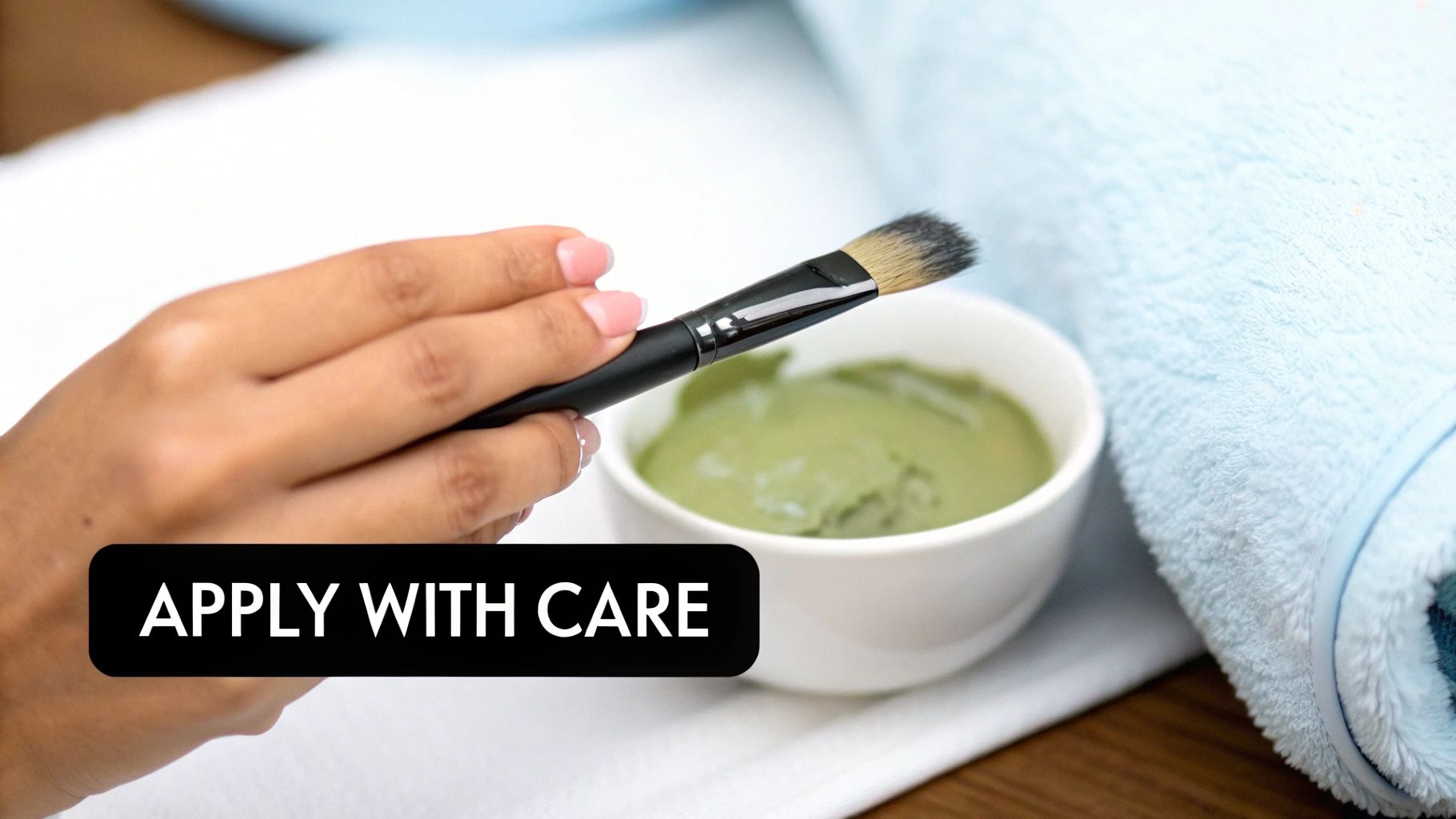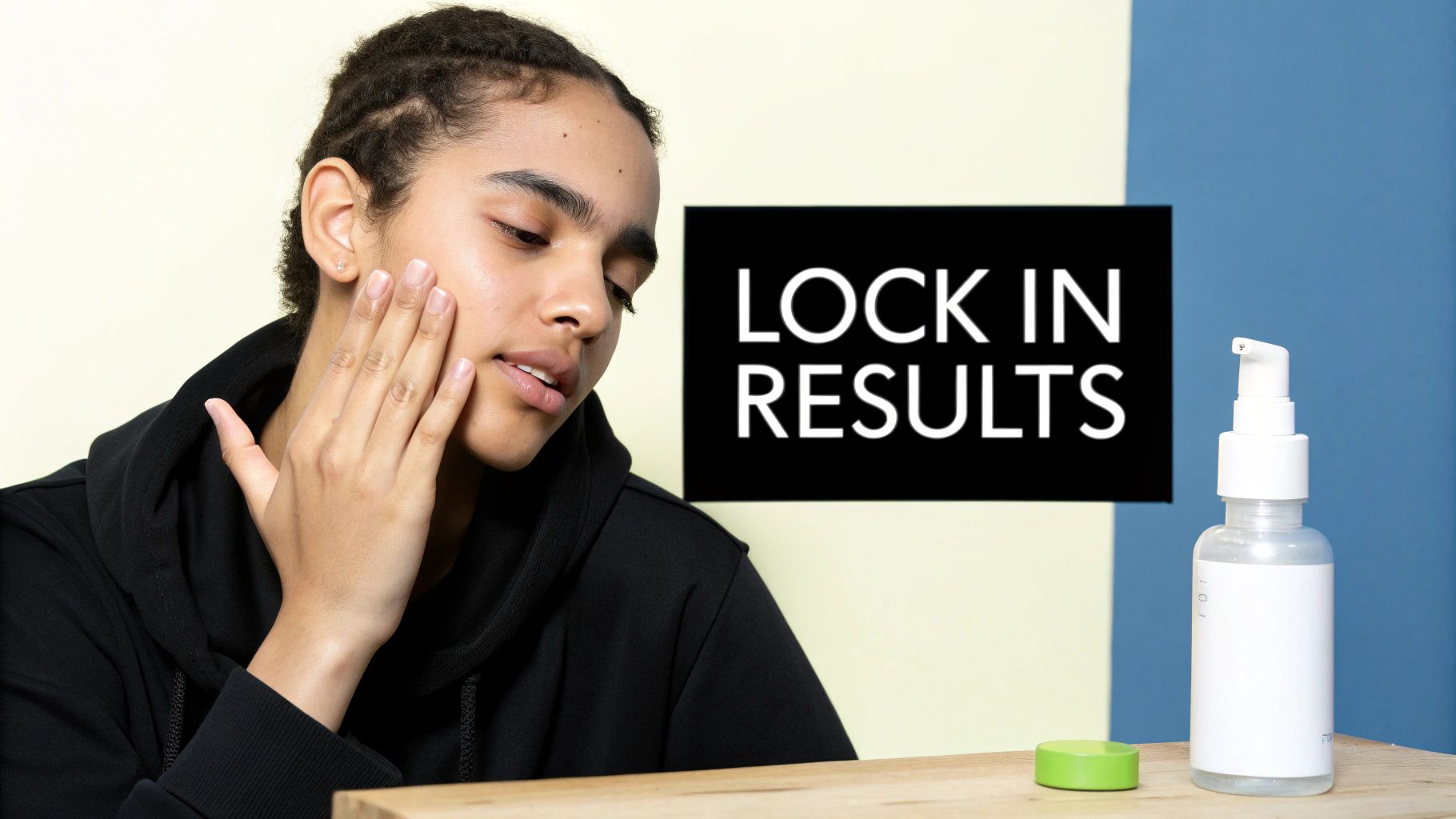Jan Elvis
07.11.2025

Jan Elvis
07.11.2025
Think of using a face mask as more than just a quick fix; it's a complete ritual. To really get those amazing results you see on the packaging, you need a solid game plan. It's a simple but powerful sequence: prep your skin first, apply the mask correctly, and then follow up with the right post-mask care to seal the deal.
This isn't just about slapping on a product and hoping for the best. This three-part process—prep, mask, moisturize—is what elevates a simple skincare step into a seriously effective treatment.
Let's be honest, we've all been tempted to just tear open a mask and put it on without a second thought. But if you want to see a real difference in your skin, a little extra effort goes a long way. Whether you're new to the masking world or have a drawer full of them, mastering the technique can completely change the game.
This is your playbook for turning a 15-minute treat into a ritual that delivers that coveted, healthy glow. It's no wonder the global sheet face mask market, valued at USD 7.383 billion, is expected to hit USD 11.15 billion by 2031. People love them because when used correctly, they work. You can dig deeper into the trends driving the sheet mask market to see just how popular they've become.
We’re going to walk through everything, from creating the perfect canvas for your mask to avoiding the common mistakes that can actually undermine your results.
Here’s what you can expect:
Before you even think about applying a mask, the most important step is picking the right one. This isn't just about grabbing the prettiest packaging off the shelf. Using the wrong mask can be ineffective at best and irritating at worst—think of a heavy clay mask on already parched skin. Ouch.
The whole secret is to match the mask's ingredients to what your skin is actually craving.
If you're not totally sure what your skin's deal is, it’s worth taking a moment to figure it out. You can learn more about how to tell your skin type to get a solid starting point. Knowing this means you can choose a product that will genuinely work for you, not against you.
This quick guide should help you narrow down the best mask for your specific skin concerns.
| Skin Type | Recommended Mask Type | Key Ingredients to Look For |
|---|---|---|
| Oily / Acne-Prone | Clay, Charcoal, or Mud Masks | Bentonite Clay, Salicylic Acid, Tea Tree Oil |
| Dry / Dehydrated | Cream or Sheet Masks | Hyaluronic Acid, Glycerin, Ceramides, Squalane |
| Dull / Uneven Tone | Exfoliating or Brightening Masks | Vitamin C, Glycolic Acid (AHA), Niacinamide |
| Sensitive / Irritated | Gel or Soothing Cream Masks | Aloe Vera, Chamomile, Centella Asiatica (Cica) |
Choosing a mask with these targeted ingredients ensures you’re giving your skin exactly what it needs to thrive.
For anyone battling a shiny T-zone and stubborn breakouts, a clay or charcoal mask is an absolute must-have. These are fantastic for pulling all that gunk—excess oil, dirt, and impurities—right out of your pores. Look for powerhouse ingredients like bentonite clay or a touch of salicylic acid to really get the job done.
On the flip side, if your skin constantly feels tight, flaky, or just desperate for a drink of water, a hydrating sheet or cream mask will be your savior. These are packed with humectants like hyaluronic acid and glycerin, which draw moisture into the skin and help restore that soft, plump, comfortable feeling.
Pro Tip: Don't be afraid to multi-mask! If you have combination skin, this technique is a lifesaver. You can apply a purifying clay mask just to your oily nose and forehead while treating your drier cheeks to a hydrating cream mask. It's a completely customized facial at home.
This handy decision tree can also help point you in the right direction, whether you're a total beginner or just looking to switch things up.

This visual breaks down the choices, giving you a clear path based on your skin's goals. And don't forget the delicate skin around your eyes! For issues like puffiness or dark circles, it's worth looking into products designed specifically for that area, like cooling eye masks for specific concerns.
The idea of using masks for targeted benefits has exploded. In fact, the global fashion face mask market hit a value of USD 1.51 billion in 2024. This shows how masks have become more than just a skincare step; they're now seen as a way to protect against environmental factors and even make a style statement.
Think of it this way: slapping a face mask onto unprepared skin is like trying to paint a masterpiece on a dirty canvas. It just doesn't work. To really let those powerful ingredients sink in and do their thing, you need to give them a clean, clear runway. This pre-mask routine is your ticket to getting the most out of every single application.
It all begins with a proper cleanse. You've got to wash away the day's grime, oil, and any lingering makeup that can block your pores. If you wear makeup or sunscreen, a double cleanse is non-negotiable—it's the best way to ensure your skin is truly fresh and ready for what’s next.
With your skin clean, the next move is to gently slough off any dead skin cells that are hanging around. This dull, flaky layer acts like a barrier, stopping all the good stuff in your mask from penetrating deep enough to make a real difference.
This is where gentle exfoliation comes in. By buffing away that top layer, you’re creating a much smoother, more receptive surface. Depending on how your skin feels, doing this once or twice a week is usually plenty. For a deep dive into the right technique, our guide on how to exfoliate your face properly has everything you need to know to get it right without overdoing it. Honestly, this one step can completely change your mask game.
I've learned from talking to countless skincare pros that good prep is everything. They all say that a clean, exfoliated surface allows for much better absorption, meaning those pricey ingredients aren't just sitting on top of old skin cells going to waste.
To finish your prep, a quick splash or swipe of toner is a great final touch. It helps reset your skin’s pH after cleansing and adds a light first layer of hydration. Now your skin is perfectly primed and ready to drink up every last drop of goodness from your mask.

You've picked the perfect mask, but how you put it on is just as crucial for getting those amazing results. A rushed, sloppy application can lead to patchy, uneven benefits, so it pays to take an extra minute to do it properly. Your technique will shift a bit depending on what kind of mask you're using.
With a sheet mask, the goal is to get it to lay flat against your skin. Gently unfold it and line up the holes with your eyes, nose, and mouth. Once it's in place, smooth it down from the center of your face outward, pressing out any air pockets. You want that serum-soaked sheet to have maximum contact with your skin.
For thicker masks like clay, mud, or creams, consistency is key. Whether you use a clean, flat brush or just your fingertips, focus on spreading an even, opaque layer across your face. Be sure to steer clear of the very delicate skin around your eyes and lips, as these areas can be more sensitive.
It’s a common mistake to think that leaving a mask on longer means it's working harder. In reality, this can backfire, especially with detoxifying masks.
Key Takeaway: Over-masking with clay or mud can strip away your skin's natural oils. This can lead to a cycle of dryness and irritation, or even cause your skin to produce more oil to compensate.
Stick to the timing instructions on the packaging, which is usually around 10 to 20 minutes. A good rule of thumb for clay masks is to rinse them off when they feel firm but aren't completely cracked and flaking. If your face feels uncomfortably tight, you’ve probably left it on too long.
The importance of proper use became a global conversation during the pandemic. In 2020, the World Health Organization projected a need for 89 million medical masks each month. This incredible demand sparked innovation in all kinds of masks, from medical gear to skincare, with a renewed focus on making them both effective and easy to use. You can discover more insights about the protective face mask market to see how this trend has shaped the products we use today.

Think you're done once the mask comes off? Not quite. What you do in the moments after your mask is just as crucial as the prep work. This is where you seal the deal and lock in all those amazing benefits.
If you’ve just used a sheet mask, whatever you do, don't rinse your face! That leftover essence is liquid gold for your skin. Gently tap and press that serum into your face, neck, and even the backs of your hands until it’s all soaked in.
For rinse-off masks like clay or mud, it's all about gentle removal. Use lukewarm water—never hot—and a soft washcloth to carefully wipe away the mask. Your skin is a bit sensitive right now, so no aggressive scrubbing.
With your skin freshly treated, it’s now perfectly primed to absorb whatever you put on next. This is the best time to layer on your targeted treatments for maximum impact.
Immediately follow up with your next few steps:
Why This Matters: Skipping moisturizer is one of the biggest post-mask mistakes. It acts like a topcoat for your skin, locking in the mask’s active ingredients and all the hydration you just worked so hard to add.
Without that final layer, all that precious moisture can start to evaporate, essentially undoing your efforts. This is especially true in colder, drier weather. If you're on the hunt for a good one, our guide to the best face moisturizer for winter has some great recommendations to keep your skin protected and glowing.
Even after you've got the basics down, a few questions always seem to pop up. Nailing the finer details is what really takes your masking game to the next level, helping you sidestep common issues and get the most out of every treatment.
Let's clear up some of the most common questions I hear.
This is probably the number one question, and the honest answer is: it depends entirely on your skin and the type of mask. There's no single rule for everyone.
Think of it this way: gentle, hydrating masks—like most sheet masks or creamy, nourishing ones—can be a regular treat. Using them 2-3 times a week is usually perfect for keeping your skin looking dewy and feeling comfortable.
But for the heavy hitters? You'll want to show a little more restraint. Masks with powerhouse ingredients like clay, charcoal, or exfoliating acids are designed for a deep clean or serious skin renewal. Stick to using these just once a week. If you overdo it, you risk stripping your skin's protective barrier, which can backfire and lead to dryness and irritation.
My best advice? Start with the instructions on the package, but always let your skin have the final say. If it starts feeling tight, looking red, or just seems unhappy, it's a clear signal to pull back.
Of course! You just need to be a bit more strategic about what you choose. The trick is to find a mask specifically designed to be gentle and calming.
Look for ingredients that are known for being skin-soothers. Your new best friends are:
Before you go all-in, always do a quick patch test. Just dab a little bit of the mask on a small spot (behind your ear or on your inner arm works well) and give it 24 hours. It’s a simple step that can save you from a whole lot of potential drama.
This really comes down to what you're trying to achieve and what fits your life. Honestly, there are great reasons to do either.
A morning mask can be an incredible prep step for the day ahead. If you use a brightening or hydrating mask, it creates this beautifully smooth, glowy base that makes your makeup glide on flawlessly. It's like an instant pick-me-up that leaves you looking refreshed from the get-go.
Masking in the evening, on the other hand, works in sync with your skin's natural overnight repair process. This is the perfect time for those deep-cleaning, repairing, or intensely nourishing treatments. The ingredients get to work their magic for hours without interruption, so you wake up with skin that feels completely renewed.
At Main Character, we're firm believers that a great grooming routine is the foundation of confidence. We create products that make building those habits easy. Find your next skincare essential at https://www.dontlooktrash.com.